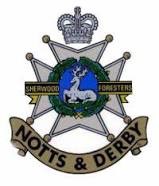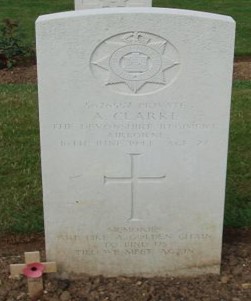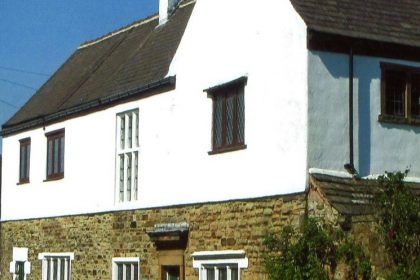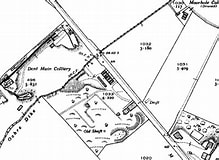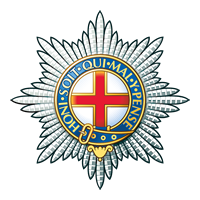A Miner Passionate Even to Madness – The Neighbourhood Terrorised Until Police Reinforcements Arrived
Seldom in the annals of crime in Derbyshire has there been recorded a more dastardly, cold-blooded taking of life of a human being, than that which disturbed the district of Eckington on Saturday night last (December 2, 1899).
There had been no longstanding quarrel between the parties; they had according to all accounts lived amicably together as neighbours.
The only friction appeared to arise out of a garden, but even this was so insignificant that it seemed impossible to believe any man could so allow his passion to overcome him as to deliberately fetch a gun to murder his supposed opponent.
But this is exactly what did take place at the little hamlet of Owlthorpe, about three-quarters of a mile from Mosborough, which many will be aware is part of the parish of Eckington in North East Derbyshire.
Here there resided quite close to each other, only a few yards separating the two houses, Henry Bird a labourer, and a kind of small market gardener, and his wife, Emily Bird and Christopher Taylor his wife, and seven children.
Taylor is a Lancashire man, hailing from Wigan, but he has lived in the district about seven years having worked during the greater part of that time at the Holbrook Collieries.
The story of the crime is so clearly related in the special report of the inquest that it is quite unnecessary to go over the simple details at any length again.
It is a short story.
Taylor returned home more or less excited with drink, and commenced damaging Bird’s garden and threatening him.
He was told that he would be summoned for damage.
He went away, returned with a loaded gun, and, finding the door had just been shut in his face, put the muzzle to one of the panels, and fired through it.
On the other side was Mrs. Bird who received the full charge at the back of the head, the spinal cord was shattered, and she died instantly.
Taylor’s passion still held the upper hand.
He returned to his house, again loaded the barrel he had fired, and paced the roads around, threatening one and all.
His actions were those of a madman, but he seems to have been soon cowed when Police Superintendent Talbot arrived from Eckington with other police.
Taylor had gone into his house, but the door was smashed open, and the Superintendent pluckily went for the prisoner, and wrenched the loaded gun from him.
P.C. Adlington secured the murderous looking knife which Taylor had in the other hand, and he was soon handcuffed and marched off in safe custody.
Taylor was charged at Eckington Police Court on Monday (December 4, 1899) with the murder of Mrs. Bird, and remanded until after the inquest.
At the Coroner’s Court
A more miserable day could not be well imagined than Tuesday (December 5, 1899).
A thick mist, accompanied by heavy downpours of rain, was the prevailing feature, and if anything is required to make a coroner’s inquiry more gloomy than ordinary Tuesday certainly provided all the necessary conditions.
Mr. C.G. Busby, the Coroner for the Hundred of Scarsdale, held his court at the British Oak, Mosborough Moor, a spot about as far removed from civilising influences as any that can be found in or near an industrial centre.
The largest room in this wayside inn was requisitioned for the jury, the police, and the press.
At the further end of the house the bar was kept lively by a throng of individuals who called “for something hot,” and the “British public” were represented by a crowd of women, with here and there a more than usually dutiful husband, who stood in the road or on the footpath opposite, in the many cases nearly up to the ankles in mud.
The rain and mist made no difference to these curious women folk.
Few of them were serious; the majority apparently looked upon the matter as a huge joke.
But what was transpiring in the coroner’s court, which, by the way, was fitted up in the tap room, was of a most serious character, and it was evident that the jury of intelligent men felt all the seriousness and responsibility of the position in which they were placed.
Sitting in one corner of the room was the man Taylor, a diminutive wiry chap, with his cotton shirt unbuttoned at the neck, a red handkerchief being tied round it, and he was handcuffed to a policeman.
During most of the day he sat with his head resting upon his left hand, which told its own tale of the seafaring life that he once led, a design in Indian ink being as prominent as if it was only put on yesterday.
That Taylor felt his position very keenly no one could question.
A Trying Ordeal for Bird
Henry Bird, the husband of the deceased woman, was the first witness called before the coroner.
The poor fellow was terribly distressed and agitated, and it was with great difficulty that the facts of the tragedy were elicited.
He said he was a collier, and lived at Owlthorpe Hill, Mosborough Moor, and the deceased woman, Emily Bird, was his wife, and 46 years of age.
He first saw the prisoner on Saturday about 11 o’clock in the morning.
He was then sitting at the door of his house with a gun in his hand, looking after some of those birds that came for berries.
His “garding” faced witness house, and was about 70 yards distant.
Witness next saw him about quarter to 8 o’clock.
The Coroner: Where were you then?
Bird could not answer for several minutes and sobbed piteously.
At last, he said: Me and my missis had gone in my son-in-law’s, George Staniforth’s, and they saw him about four yards from the house.
George Staniforth was sitting in a chair, and my missis and me were with him.
We were all that were in the house.
Whilst you were there did you hear somebody shouting outside?
I was sitting by the fire looking at the war pictures – they had gotten a few – and George used to read to me at night.
But you heard somebody shout outside?
Yes, I was sitting there and my wife was started to mix a bit of paste, you know, and Taylor and his wife comes up, shouting, gauping, and making ever such a noise.
Did you go outside?
Of course, in a while.
How long?
Happen 5 minutes.
Did you hear anybody call your names?
I heard me name called over a time or two before I opened the door.
Did you hear any other words besides your name?
Yes, he said, “I will blow your (expletive) head off.”
His missis kept on saying Come on l”
When I opened the door I saw him leaning against the wall alongside the garding.
I also saw a woman’s form in the road.
When I opened the door, Taylor was agate preaching at the end there, and kept on gauping “will blow you (expletive) head off,” and “I will set your (expletive) house on fire.”
I stood there and said nothing for a while.
I said to him, “Here, do you know what you are talking about?” It was (expletive) every word almost he spoke. He could not open his mouth without it.
I said, “If you don’t mine what you say, I will take you somewhere else.”
He was still for about a minute, but he got over the garding, and came across the garding within two yards of me.
His wife came running down to the door stone to me, and said, “Take no notice of him, Mr. Bird.”
I said, “I don’t, but see how he has trampled on my flower plants. He will have to pay for trampling them down like that.”
He did not say anything, and I turned round and went into the door place.
He was in the garding in his shirt sleeves.
Did you see him take his coat off?
Yes, he took it off when he got over the wall.
Had he any gun in his hand then?
No, sir, if he had I should not have been here now.
Did you say anything about having a witness?
Yes, George Staniforth came to the door, and I said. “You must mind what you are talking about I have a witness here.”
Then he got over the garding, and bangs his jacket off, and comes across within two yards of me, and puts himself in an attitude like this (as if he was going to strike him).
Within a moment there was some more shouting and gauping, and my missus was stood at the end of the table, near the door, working, and Taylor was shouting and gauping that he had lost his (expletive) jacket.
He shouted out, “Bring a leet; I’ve lost me (expletive) jacket.”
He was in the garding.
My missis says, “I will go and fetch you your stable lamp, and look for it, or else he will be trampling all the plants down.”
I said to her, “Never mind,” but she took the key, brought the lamp and lighted it, and went out into the gardening, but I did not go out of doors myself.
In a few minutes she came running back with the lantern, and in a great fright said, “He’s coming with a gun and says he is bound to blow your (expletive) head off.”
She rushed in and slotted the door.
She had just slotted the bolt and stood for a moment with her back to the door.
What was the next you heard?
I heard Taylor run across the garding, but I never heard his footsteps real until he sketched the head stones.
I heard him say, “I will blow your (expletive) head off,” and then the gun went off.
Did he stumble?
He might a bit. I heard his voice in a second afterwards.
How soon did the gun go off after he had said those words?
He had no sooner said them than the gun was gone, I saw the smoke pass her ear as she stood up against the door, I was not half a yard off myself.
As soon as ever the shot struck her she began to settle down, and I gripped hold of her and said, “Oh, dear, she is dead.”
She was dead that instant the gun went off; it was instant death.
I screamed out, and Taylor took his hook across the garding and off home.
Did you see the hole in the door?
Yes, sir.
Where was she wounded?
She was wounded at the back of the head and she hair was like dried chaff and ground up.
Did you go out of the door to look for Taylor?
As soon as I could get out of the door I went down to fetch me daughter and a policeman.
When you saw Taylor at quarter to eight that evening was he sober?
No; he was in drink.
Have you ever had a quarrel with Taylor?
Never had an angry word with him in my life. His own wife said she did not know whatever he had done it for.
Supt. Talbot: Do you remember hearing any threatening language after the gun went off?
Outside, yes. He was squaring up about the garding and swearing, He was agate many a while. He said he would blow anybody’s head off who went for him.
Do you remember the prisoner saying anything else?
No. Not at that time. He did come running his wife down the lane, and they had to lock her up for safety.
A Juror: Do you think it was his intention to kill you instead of your wife?
Yes, but I never had nothing against him, and did not know anything was against us.
Do you think he was aware your wife was at the back of the door?
He knew we were in the house.
Do you think he knew she was at the back of the door?
Yes, she had just slotted the bolt and he heard it.
The Coroner: If a man has a gun in his hand and he intends to kill A, but kills B, in the eyes of the law it is as much wilful murder as if he killed A.
The Coroner (to Taylor): Do you want to ask any questions?
Taylor: No; I don’t know nothing about it; I was stupid drunk.
The Coroner: You had better not say anything else.
“Could only be Hung Once”
George Staniforth said he was a labourer living at Owlthorpe, and was a son-in-law of the last witness.
He lived about 200 yards from his farther-in-law.
Witness first saw Taylor at about 20 minutes to eight, and at that time deceased and her husband were in witness’ house.
Prisoner was then shouting, and Bird went to the door
Taylor was then in the lane, and witness heard him threaten to shoot Bird.
A short time after Mrs. Bird was going to take the lantern, she had looked for Taylor’s jacket, into her own house, but she had not been away a minute before she came running back.
She appeared to be very frightened, and she locked the door on the inside, and stood with her back against it.
Her husband was then standing about half a yard from her.
Just at this time witness heard footsteps outside the door, and, from the outside, Taylor repeated his former threats.
At the same moment the report of the gun was heard, and the bullet passed through the door, and deceased died immediately.
The police brought Taylor into witness’ house shortly before ten o’clock, and he called Superintendant Talbot an Irish (expletive).
He also said, “Well, if I’ve to be hung, I’ve only to be hung once,” and added that if he was not hung he would shoot old Bird as soon as he came out.
Prisoner was not sober when witness saw him about eight o’clock.
Witness had never heard any quarrel between the parties, but, on the contrary, they always seemed to be on friendly terms.
Superintendant Talbot: you were in the inside of your own house and heard a gun fired.
After you heard the report did you hear any remarks or threats used?
Witness: Not after the report of the gun.
Did you hear any bad language used by any person outside?
I can’t say that I did.
You heard the prisoner use threats just before you heard the gun go off?
Yes, sir.
You were present when I charged the prisoner?
Yes.
You saw me wright the charge and the prisoner’s statement in my pocket-book?
Yes, in our house.
A Juryman: Was Taylor in a violent temper during the time, or was he very drunk
He seemed in a very violent temper.
Another Juryman: Has he ever threatened Mr. Bird before?
Not to my knowledge.
Did he throw a challenge out to fight Mr. Bird when he took his coat off?
I never heard him.
Another Juryman: Still you heard him say that he would shoot Mr. Bird?
Yes, sir.
You say he was worse for drink; was he really drunk?
I should say he was about half and half.
The Coroner: Drunkenness is no excuses for a man to commit a crime.
A Game of Hide and Seek
Edmond Jowett, farmer of Mosborough Moor, said that he lived about 400 yards from Owlthorpe.
About 8:20 p.m. on Saturday he was in the yard when he heard two voices as though Quarrelling, which was followed by a gun shot.
Afterwards he heard someone running on the road, and going out he met Henry Bird who was crying.
When asked what was the matter, Bird said, “Chris Taylor’s shot my wife.”
Witness drove to Mosborough and reported the matter to P.C. Adlington, Who returned with witness in the cart to Owlthorpe.
They went towards Taylor’s house, and by a light from the house they saw him walking in the garden with a gun in his hand.
They got to the back of the edge, and Taylor said, I can hear the (expletive) sticks cracking. Who the (expletive)’s there?
If you don’t (expletive) come out I’ll put some (expletive) lead into you.”
He went towards them, and they went farther down the lane.
He followed them, and when they got at the back of a wall by the side of Bird’s gateway, Taylor called out, “If you don’t come out, I’ll put some lead into you.”
He went up the lane again and went into his house.
He came out in a few minutes, and said, “I’ll burn all up. I’ll have a bonfire with oil and paraffin,” and then added, “see how it blazes,” but witness could not see anything burning.
Eventually the prisoner was arrested by Superintendant Talbot and his men.
In answer to Superintendant Talbot, witness said that after hearing the gun fired he heard a voice, which he recognised as belonging to Taylor, saying: “Thou, canst come out, I have got another barrel waiting for thee,”
The enquiry was then adjourned for lunch.
A Painful Interview Between Prisoner and his Wife
Taylor’s appearance was altogether a sorry one and pitiable in the extreme.
Words cannot picture the evident agony that he endured.
This was more noticeable after the adjournment for lunch, during which time it was the painful experience of a member of our staff – one of the most painful experiences, in fact, in a varied Press life – to witness an interview, kindly allowed by Superintendent Talbot, between Taylor, his wife, and seven little children.
The eldest child is a mere strip of a lad, who has just commenced to earn a few shillings in the pit, and the others ran down to one a few months old in the arms of the mother, who is said to be, and who by her own respectability and the tidiness of her children appeared to be, a most careful, diligent, and hard-working woman.
Directly Taylor saw his children he burst into tears, and heartrending were the sobs of the prisoner who seemed to have abandoned all hope since listening to the evidence of Bird.
How brave a woman can be was now seen!
Caressing her handcuffed husband, she boldly repeated several times “Cheer up, my lad, things are not so bad as they look.”
The little children wept with their father, but the mother shed not a tear until Taylor, handcuffed to the constable, was once again removed to the coroner’s court.
Then when the wife was alone she broke down and despairingly sobbed until other kindly disposed women came forward and consoling her took her away from the court.
An Instantaneous Death
Dr. West Jones, physician and surgeon, of Eckington, deposed; On Saturday (December 2, 1899) I was called to Owlthorpe, and went to the house of George Staniforth, and found the body of Emily Bird lying on the floor in a pool of blood.
She was quite dead.
There was a wound in the back of the neck on the right hand side to the right of the middle line. It was a jagged wound, such as would be caused by gun shot.
He made a post-mortem on Sunday (December 3, 1899).
Above the right shoulder blade there were slight wounds caused by shot.
There was a large jagged wound, which ran inwards and upwards towards the spine.
A large number of fragments of bone could be felt.
The base of the scull was intact, but the two upper bones of the spine were shattered all to pieces, and the spinal cord cut through close to its junction with the brain.
All the other organs were quite healthy.
“My conclusion is,” gravely added Dr. Jones, “that the injuries described would most certainly mean instant death. I should mention that there were splinters of the wood in deceased’s hair.”
The Coroner: Did you find the shot?
I found some in the external wounds, but I could not have followed the other without mauling the body considerably.
A Juryman: Dose the doctor think the man was drunk at the time?
The Coroner: I don’t think you can hardly ask that question.
Dr. Jones: I saw Taylor three times on Saturday night.
The Coroner: Then was he drunk when you saw him?
No; I should say he was perfectly sober.
By Superintendent Talbot: I saw you draw the charges from a double-barrelled gun in the lock-up.
Taylor was present.
Each barrel was charged with powder and shot.
Keeping Taylor in Sight Until Reinforcements Arrived
P.C. Tom Adlington, stationed at Mosborough, stated: At 8:20 p.m. on Saturday, from information received from Edward Jowett, farmer I went to the house of George Staniforth, and saw the body of Emily Bird lying dead on the floor of the house with a wound in her neck.
The hole in the door was about the size of a four shilling piece outside, but inside it was larger, the shot having spread.
I went up to Taylor’s house with Mr. Jowett. We saw him in the garden with a gun.
We bent down under the garden hedge, and Taylor shouted, “Come out from under the hedge. I can hear the sticks cracking. I shall put some (expletive) lead into you if you don’t.”
He came towards the road.
We went to a gateway near Bird’s house, Jowett standing on one side, and I on the other.
Taylor came to within a yard of where we were, and said, “Come out. I don’t care who the (expletive) you are. I shall put some shot into you or some cold steel.”
Taylor went back to his home and we followed him, getting behind a wall near the gable end of a neighbour’s house.
He came out again, and said “I will burn all the (expletive) lot up. Oil and paraffin will (expletive) well shift owt.”
Immediately after that Superintendent Talbot came up.
A Dramatic Arrest
I went up to the house again with the Superintendent and Sergeant Hughes.
Taylor put his head through a window, and said, “Let that big fat-bellied Sergeant come: I know he hasn’t much stomach.
I borrowed a gun from Mr. Staniforth’s and we fired it in the air outside.
Sergeant Hughes ran at the door with his foot, and the door flew open.
Superintendent Talbot went in first, and the Sergeant and I followed close behind.
We saw Taylor sitting on a bed in a room on the right hand side going in with a gun (produced) in his left hand, and a knife (produced) in his right.
Taylor had the knife open and grasped in his hand.
The superintendent got hold of the gun and dragged it from him.
I sprung on him and held him back on the bed, whilst the sergeant took the knife from him.
We then took him into custody, and handcuffed him between me and the Superintendent, and went down to the house where the body was.
The Superintendent charged Taylor with “killing and slaying Emma Bird by shooting her with a gun.”
He said “You can do what the (expletive) fire you like. They can but hang me, can they? If I live to get out again,” he said, he was going to do something to someone named Bird but I could not make out what it was.
We then took him to the Eckington lock-up.
The Coroner: What state was the prisoner in?
He seemed to have had drink, but he was not in that state but what he knew entirely what he was doing so far as I could see.
Of course, he was very excited?
Yes, sir, very excited.
A Juryman: Were both barrels loaded when you arrested him?
Yes, and he had the gun at full cock.
Taylor Asks a Question
The Coroner (to Taylor): Do you want to ask anything?
Taylor: Yes, sir, I should like to ask that constable whether he got that knife out of my hand or off the table? It very likely was lying on the table as it was the knife my missis always carved with.
The Coroner (to witness): Did you take that knife out of his hand or off the table?
P.C. Adlington: I took it out of his hand, his right hand.
Knew the Sort of Man
Superintendent Benjamin Thomas Talbot, in charge of the Eckington division, said from information received he went to Owlthorpe to arrest Taylor on Saturday night.
He knew the sort of man he had to deal with and made his arrangements accordingly.
He sent for a gun, sent Constable Roland to the back of the prisoner’s house, fired the gun into the air and rushed into the house, followed by Constable Adlington and Sergeant Hughes, and they arrested prisoner in the bedroom.
All three of them were close together, the men having followed him very well.
He corroborated the evidence given by P.C. Adlington.
They rather roughly handled Taylor, but not more than was necessary.
The gun was at full cock when he took it away from Taylor, but he did not see the knife until it was taken by force from his possession.
The gun that he borrowed was for the purpose of deterring him from injuring them, and not for the purpose of injuring him.
A Very Curious Case
The Coroner said that the case was a very curious one indeed.
There did not appear to have been any ill-feeling between Bird and the prisoner Taylor before Saturday, and even in the disturbance the bad language appeared to have been all on one side.
Prisoner’s language was certainly very extraordinary indeed.
The prisoner was said to have been in drink, but that was, he might point out to them, no excuse for the crime committed.
They must remember that if they returned a verdict of “wilful murder” it did not necessarily mean that he would be convicted.
The fact that when charged by Superintendent Talbot the prisoner replied, “They can’t do more than hang me, can they?” did not look as if the affair had been an accident.
They must remember that if Taylor went to the door intending to shoot Bird, but shot the deceased instead, it was just as much murder as if he had shot Bird.
Verdict of Wilful Murder
After the jury had considered their verdict in private, the foreman, Mr. John Drabble, intimated that they had come to a decision.
The Coroner: What did you find?
Mr. Drabble: We find that the evidence given in this case is so straightforward that there is no doubt about it, but that it is a wilful act and deed, and we are all unanimous that he should be sent for his trial upon the capital charge.
The Coroner: I am bound to say that I quite agree with you.
Sympathy with Prisoner’s Wife
At the close of the enquiry one of the jurymen proposed and another seconded a resolution that their fees for attendance should be paid over to the prisoner’s wife, and this was agreed to.
The Coroner then pointed out that the woman by all accounts had done all she could to get her husband away before the crime was committed.
He must add that the police had done all they could to secure the prisoner, and he must give them credit for it, and to Police Constable Adlington for sending so smartly for his Superintendent.
The Funeral of the Victim
The funeral of Mrs. Bird took place on Tuesday afternoon (December 5, 1899).at Eckington Cemetery, while the inquest was in progress. There was a large attendance of sympathising people from the neighbourhood, and a constable was present on behalf of the Eckington police.
At the Police Court
Prisoner was again brought before Alderman J.F. Swallow, and Major L. Butler-Bowdon, at the Eckington Police Court on Wednesday (December 6, 1899)., and charged with murder.
He appeared to feel his position acutely, and held his head down during the whole hearing.
His wife was in Court, and was terribly agitated and concerned.
Mr. J.T. Jones, of Eckington, had been instructed to defend.
Captain Holland, the chief constable of the county, was accommodated with a seat on the Bench.
Mr. J.H. Morewood, architect and surveyor, had prepared plans of the scene of the murder, which were handed to the Magistrates.
The fact that the prisoner was being brought before the Magistrates that morning was not generally known, and consequently there was only a moderate attendance at the Court.
Those present listened with intense interest to the evidence, and never had the Eckington Police Court been so silent during the hearing of a case.
Save for a sob now and again from the husband of the unfortunate woman and the voices of the witnesses, hardly a sound could be heard.
The witnesses called were the same as those examined at the inquest with the exception of Jowett, who was not called, and they gave their evidence in a very clear and satisfactory manner.
Bird was totally overcome by grief, and when he told the magistrates how he saw the wood fly from the door and into his wife’s neck, who was standing close to him, with a smile on her face, he completely gave way, and sobbed aloud.
The first witness called was Dr. West Jones, of Eckington, who repeated the evidence he gave at the inquest.
The Chairman: Did you find the shot?
Witness: No, sir, it was probably scattered about in the muscles. I could have found it probably with further mutilating the body.
The Assistant Magistrates’ Clerk: What, in your opinion, would cause the wound?
Witness: It is one such as would be caused by a gun shot.
In answer to Mr. J.T. Jones, witness said as he was going to Owlthorpe he met prisoner in the lane, but did not speak to him then.
The next time he saw him it was in the house, and he spoke to the prisoner, and was answered by him.
The next time he saw hi, was in the cell at Eckington.
Mr. J.T. Jones: Did you put any tests to see if he was sober or not?
Witness: Yes.
Was he at all excited?
No.
On the application of his solicitor, the prisoner was accommodated with a seat in Court.
Henry Bird, collier, Owlthorpe, husband of the deceased, who appeared to be much affected, and broke down several times, then repeated his story of what happened.
He said he and prisoner lived about 20 yards apart.
The Assistant Magistrates’ Clerk: Have you ever had any quarrel with the man at all?
Witness: No, sir, we have never had an ill word.
The Assistant Magistrates’ Clerk: You were not at all unfriendly with the deceased, were you?
No, Sir; not that I know of. If he suspected anything, I don’t know.
Was the prisoner sober?
Well he had a bit to sup.
John Staniforth, the son-in-law, then told what occurred on the eventful night.
P.C. Adlington and Superintendent Talbot also repeated the evidence they gave at the inquest.
This completed the case for the prosecution, and the prisoner was formally charged.
When asked if he had anything to say, he said, “Not guilty; I reserve my defence.”
The Chairman: “Christopher Taylor, you will be committed to take your trial on the charge of wilful murder at the next Derbyshire Assizes.”
Prisoner seemed quite aware of the serious nature of the charge and bowed his head when the Chairman addressed him.
He was afterwards removed to the cells by Sergeant Hughes.
Similar Posts



